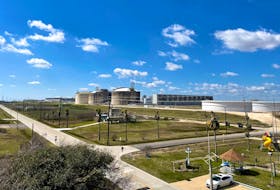By Nick Moase
The Advance
NovaNewsNow.com
The federal government has lent $500,000 into startup company Cellufuel for their Brooklyn based demonstration project, and the company is already looking to the future for a full time operation in Clare.
The press conference was held in part of the former mill site that will also house their demonstration project later this year.
"Retooling the economy happens one company at a time, and one product at a time," said South Shore St. Margaret's MP Keddy of why the federal government made the investment.
Chris Hooper, CEO of Cellufuel, says this investment from the government is part of the tremendous support they have received from both government and community.
"We see the opportunity as something that will not only benefit our company, but also the communities of rural Nova Scotia and perhaps other parts of Canada as well," he says.
CelluFuel’s pilot plant works by taking low-value wood fibre and converting it into synthetic diesel fuel for the refinery market. If the demonstration project works, and Hooper is confident it will, the next step will be starting a full-scale facility in Clare in 2015.
The reason they chose Clare was because there is a space they can use at the former Comeau Lumber site in Clare. It also has 50 acres and existing infrastructure that they can use to start operations.
Clare also has a good supply source in their target radius, says Hooper. Cellufuel's business model is looks at a smaller scale supply chain, with a radius of 50 to 75 km.
"Moving wood is very expensive, and it reduces margins for everyone in the supply chain. We feel being in close proximity to the resource we will consume is much more beneficial to everyone," he says.
Hooper says instead of one big plant in Southwest Nova Scotia, their target would see at least three and up to five plants at some point.
These plants would create around 25 direct jobs, plus a spin off of four to six times as many jobs along the supply and distribution chain, he says.
The funds come as a $500,000 repayable investment, through ACOA’s Business Development Program (BDP), supports the purchase of special equipment to establish the plant. The Province of Nova Scotia previously announced a $1.5 million repayable investment in the Cellufuel project in 2012.
CelluFuel Inc. is a Nova Scotia-based cleantech start-up firm, established in October 2012.
The company was founded loosely about two and a half years ago by a group of four individuals who all worked in the forestry industry. They recognized the industry was in a state of decline, however at the same time felt there was still opportunities to be had.
The commercial demonstration plant is expected to have an initial capacity of 1.3 million litres of diesel per year.
By Nick Moase
The Advance
NovaNewsNow.com
The federal government has lent $500,000 into startup company Cellufuel for their Brooklyn based demonstration project, and the company is already looking to the future for a full time operation in Clare.
The press conference was held in part of the former mill site that will also house their demonstration project later this year.
"Retooling the economy happens one company at a time, and one product at a time," said South Shore St. Margaret's MP Keddy of why the federal government made the investment.
Chris Hooper, CEO of Cellufuel, says this investment from the government is part of the tremendous support they have received from both government and community.
"We see the opportunity as something that will not only benefit our company, but also the communities of rural Nova Scotia and perhaps other parts of Canada as well," he says.
CelluFuel’s pilot plant works by taking low-value wood fibre and converting it into synthetic diesel fuel for the refinery market. If the demonstration project works, and Hooper is confident it will, the next step will be starting a full-scale facility in Clare in 2015.
The reason they chose Clare was because there is a space they can use at the former Comeau Lumber site in Clare. It also has 50 acres and existing infrastructure that they can use to start operations.
Clare also has a good supply source in their target radius, says Hooper. Cellufuel's business model is looks at a smaller scale supply chain, with a radius of 50 to 75 km.
"Moving wood is very expensive, and it reduces margins for everyone in the supply chain. We feel being in close proximity to the resource we will consume is much more beneficial to everyone," he says.
Hooper says instead of one big plant in Southwest Nova Scotia, their target would see at least three and up to five plants at some point.
These plants would create around 25 direct jobs, plus a spin off of four to six times as many jobs along the supply and distribution chain, he says.
The funds come as a $500,000 repayable investment, through ACOA’s Business Development Program (BDP), supports the purchase of special equipment to establish the plant. The Province of Nova Scotia previously announced a $1.5 million repayable investment in the Cellufuel project in 2012.
CelluFuel Inc. is a Nova Scotia-based cleantech start-up firm, established in October 2012.
The company was founded loosely about two and a half years ago by a group of four individuals who all worked in the forestry industry. They recognized the industry was in a state of decline, however at the same time felt there was still opportunities to be had.
The commercial demonstration plant is expected to have an initial capacity of 1.3 million litres of diesel per year.









